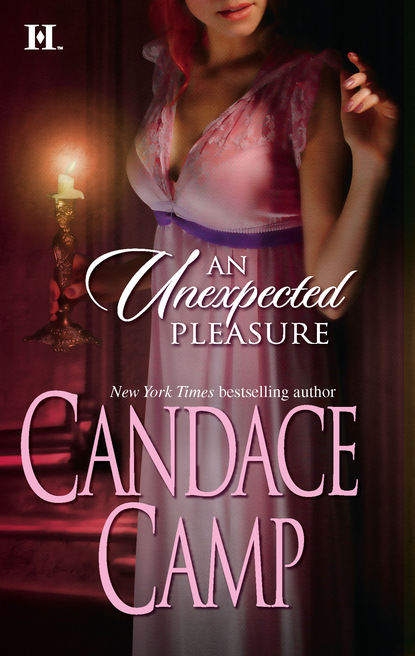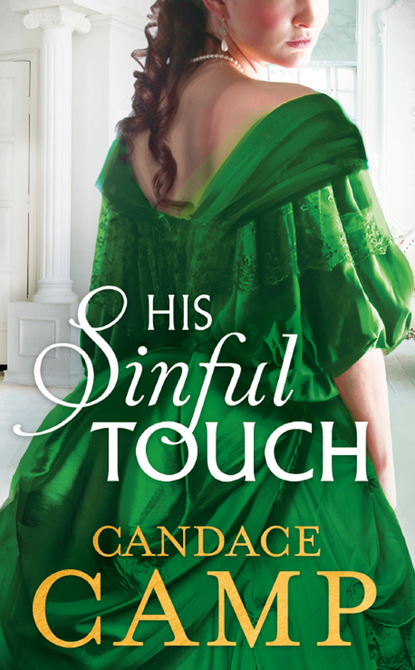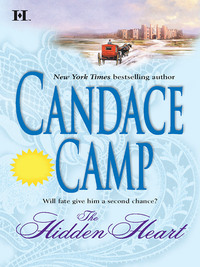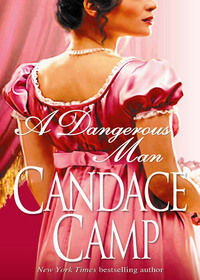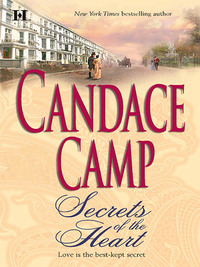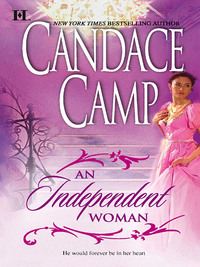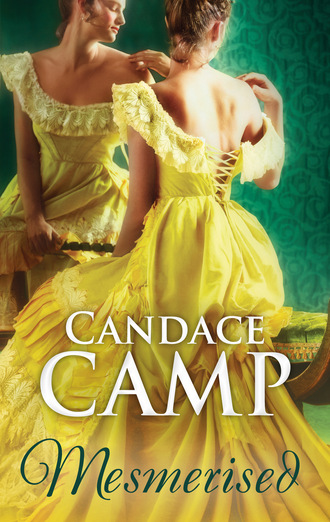
Полная версия
Mesmerized
What he had seen of Miss O. Q. Moreland certainly had done nothing to change that impression. She was decidedly peculiar—going out alone in the evening to attend séances, sneaking through darkened rooms to pounce on a fraudulent medium and expose her practices, even carrying on a business of doing such things!
Stephen idly rubbed his thumb over the engraved letters of her card. Investigator of Psychic Phenomena. He couldn’t help but smile a little, thinking of her feisty stance, hands on hips, looking up at him with those big brown eyes that looked as though they should be soft and melting but were instead fierce. Small and dainty, yet looking as if she were ready to take on any opponent.
He remembered the odd feeling that had gone through him when the light had been turned on and he had first looked at her. He had thought her a part of the medium’s act, helping to hoodwink an innocent public. Yet when he looked at her, something had shot through him, some strange current of emotion and physical attraction that jarred and surprised him. It had been something like desire...and yet something more, as well, something he could not remember ever feeling before.
Frowning, he turned and started to walk away, but the man who had been beside him at the séance came out the front door at that moment and hurried down the steps toward him, saying, “St. Leger!”
Stephen turned, surprised. “Capshaw. I thought you must have decided to stay.”
The other man made a face. “I doubt that I would have been welcome, frankly, after the scene you made. But I had to do what I could to calm down Colonel Franklin. I told him that you were my cousin and a gentleman and would not spread scurrilous lies about him.”
“I don’t give a damn about that pompous colonel,” St. Leger said, grimacing.
“What were you doing, by the way?” Mr. Capshaw went on curiously. “Did you go there to expose the medium? I must say, I didn’t think it sounded like your sort of entertainment.”
“Hardly. But I wasn’t planning to do anything. It was just that when I heard her rustling about in the dark, I could not resist the opportunity to catch one of the charlatans red-handed.” He shrugged. “I went merely to—I don’t know, see what sort of thing they do. Try to understand what their hold is on otherwise rational people.”
“There are more than a few who believe in it,” Capshaw commented. “I’ve seen one medium who did things that, well, frankly left me wondering.” He glanced over at his friend. “Don’t you ever think that maybe it’s a possibility? That people can speak to us from the other side?”
“It strikes me as highly unlikely,” Stephen said shortly. “If they could, surely they would tell us something more important than the wretched pap these mediums put out. And why do they spend their time knocking on things? One would think that they would have better things to do with their time than play parlor tricks.”
Mr. Capshaw chuckled. “That sounds like you.”
“They are playing on people’s grief,” St. Leger went on grimly. “Using it to gain money.”
His friend glanced at him. He had heard that Lady St. Leger, Stephen’s mother, had been attending the séances of a popular Russian medium, and the anger in his friend’s voice confirmed his suspicion. Stephen’s older brother had died almost a year earlier, and their mother was said to be still mired in grief over his death.
“Sometimes,” Capshaw said carefully, “it helps a person get through it, thinking that they can contact their loved one.”
“It helps the damned medium acquire money,” St. Leger growled. “And how do you know it helps them? What if it just keeps them in that same painful place, constantly mourning their loss, never getting on with their lives?”
He stopped and looked at his companion. “I thought Mother was getting better, that she was not so wrapped up in sorrow as when I first came home. And when she wanted to take Belinda to London, it seemed a good sign. But then she fell in with this Valenskaya woman, and now she seems deeper in mourning than ever. I told myself the same things you said, that it didn’t matter if it wasn’t real, that it would help soothe her. What did it matter if she went to a few séances? But when Belinda wrote me and said that Mother had given this medium her emerald ring out of gratitude for all she’d done... Father gave her that ring! I have never seen it off her hand until now. Obviously this woman is exercising great power over her. That’s why I came to London. And it didn’t help my fears any when I saw Mother, either. She is forever talking about what this woman says, she and Belinda both, and it all sounds like the most blatant nonsense. Yet they seem to swallow it without a moment’s thought.”
Capshaw gave him a sympathetic glance, but, as Stephen knew, there was little he could say to help him.
“If only I could prove to her that the woman is a fraud!” Stephen went on. His thoughts went then to Miss Moreland of the snapping brown eyes and the business card, but he pushed her aside immediately. A man could hardly ask a woman to get rid of his problems for him, after all, and, besides, he could not expose his mother to the embarrassment. Besides, the woman was probably as peculiar as everyone said all her family were.
They continued for a moment in silence; then Stephen said, with studied casualness, “What do you know of the Morelands?”
“Morelands? Who do you—oh, you mean Broughton’s brood? The ‘mad Morelands’?”
“Yes.”
Capshaw shrugged. “I don’t know any of them personally. Although the eldest was at Eton at the same time I was—some damned peculiar name, I remember that. They’ve all got peculiar names. Roman or Greek or something. Broughton’s always been mad for antiquities, you know.”
“Yes, I remember that much.”
“He was a daredevil—the one at Eton when I was there. Always into some scrape or other. Not the sort of chap I was mates with. It was enough to make one tired just hearing all the things he’d done. Theo—that was what we called him. His real name was something longer, Theodosius or some such. He’s an explorer now, I’ve heard. Always off paddling up the Amazon or trekking through Arabia or something.”
“Ah. Even more peculiar than haring off to the U.S., I suppose.”
Capshaw glanced at him, then gave a rueful grin. “Well, yes, I guess he would be someone you might get along with. If you and I weren’t cousins, we probably wouldn’t be friends, either. He was a couple of years behind you at Eton, though.” He paused, then said, “There are several others, all younger, though. The girls, I think, tend to be bookish. Don’t go out in society—well, except for The Goddess.”
“The who?”
“Oh, some poetic sort gave her the name years ago when she came out, and it rather stuck. Suited her, you see. Lady Kyria Moreland. If ever anyone could carry off such an epithet, it is she. Tall, statuesque, flaming red hair...she’s a beauty, right enough. Odd, though—she could have married anyone, had suitors begging for her hand right and left, still does get plenty of offers, so I’ve heard, though she’s been out for eight years, at least.”
“She’s still unmarried?” St. Leger asked, surprised.
“Yes. That’s what I’m saying. All the women say she’s the maddest of the lot. She could have been a duchess, a countess... Even some prince or other asked for her hand—foreigner, of course, so no surprise she didn’t accept him. But still...she turned them all down, says she enjoys her life just as it is. Doesn’t plan to ever marry.”
“Definitely one of a kind,” St. Leger commented.
“Oh, and one of the daughters blows things up.”
“I beg your pardon?”
“Burned down one of the outbuildings at Broughton Park a couple of years ago. Caused a bit of a stir.”
“I see. For any particular reason?”
His cousin frowned. “Not sure, really. Just heard it round at the club, that Broughton’s daughter burned it down, and it wasn’t the first time she’d blown something up. Oh, and that Broughton was in a flap about it—it was next to some shed full of his pots or something.”
“Interesting.” St. Leger wondered if it was another daughter or his own medium-chaser who had engaged in the pyrotechnics.
“Why are you so interested in the Morela—oh, wait!” Capshaw’s brow cleared. “Don’t tell. Is that your ‘ghost’? She was one of Broughton’s brood?”
“Apparently.” Stephen nodded.
“Good Gad,” Capshaw said, much struck by the revelation. “Well, not really a surprise, I suppose.”
“No. But, you know, she didn’t seem that peculiar, really.” He paused, then added, “Well, maybe a bit odd, but quite sharp and—somehow appealing, for it all.”
“Appealing?” His friend narrowed his eyes in speculation.
“Yes. In a general way, you know.”
“Mmm-hmm.”
Stephen grimaced at his companion. “Don’t give me that look. I have no interest in Miss Moreland. Believe me, the last thing I am looking for is a woman, particularly a peculiar one. Between the estate and my mother falling into some charlatan’s clutches, I have enough on my plate.”
The two parted soon after that, Capshaw hailing a hansom to take him to his rooms and St. Leger turning to walk the last two blocks to his family’s home.
It was a pleasant town house, narrow and tall, built a hundred years earlier in the Georgian style by a St. Leger ancestor. Stephen stopped at the foot of the steps leading up to the elegant front door and looked at the house for a moment. This house held some of his sweetest and bitterest memories, for it had been here where he lived when he came to London as a young man. When he had fallen in love...and later lost her.
Shaking off the memory, he trotted up the steps and opened the door. A footman came forward promptly to take his light coat and hat.
“My lord. I hope you had a good evening.”
“Not as productive as I’d hoped.”
“Lady St. Leger is in the drawing room.”
“They didn’t go out?”
“I believe that she, Miss Belinda and Lady Pamela did go out earlier, sir, but they returned a few minutes ago. Her Ladyship asked me to tell you that she would like to see you if you came in early.”
“Yes, of course.” Stephen turned and went down the hall to the formal drawing room, a narrow elegant blue-and-white chamber. Pamela had redecorated it, of course, as she had the rest of the house, after Roderick had come into the title. Stephen preferred the warmer, darker colors of the room when he had lived here years ago.
His mother was sitting at the piano, playing a quiet air, when he came in. Belinda, his lively younger sister, was seated beside her, turning the pages of the music for her. Pamela, he was sorry to discover, was also there, sitting on a pale blue velvet love seat, a bored expression on her face. It changed when Stephen entered the room, turning into the slow, faintly mysterious smile that she was well-known for, a smile that promised a wealth of secret pleasures.
“Stephen,” Pamela said in her husky voice. “What a pleasant surprise.” She laid her hand in silent invitation on the seat beside her on the love seat.
“Pamela,” Stephen replied stiffly, giving her a brief nod, then going to his mother at the piano. He bent and kissed her lightly on the cheek. “Mother. I am surprised to find you home so early.”
Lady St. Leger gave him a sparkling smile. She was dressed, as always, in the complete black of mourning, although tonight a pair of diamonds dangled at her ears, catching the light. White hair curled softly around her face, gentle and still pretty despite the years and sorrow that had visited her.
“There were really no parties of any consequence,” his mother explained. “The season’s all but over, really. And Belinda was tired. So we just visited friends.”
Belinda jumped up from her seat, belying any indication of tiredness, and came around the piano bench to greet her brother. Her hair was dark, like his, arranged on her head in a cascade of curls, and her eyes were also gray, though softer than his silvery brightness. She was a pretty girl, with the light of intelligence and curiosity in her eyes, quick to smile and laugh.
“Stephen!” she cried now as she reached out to give him a hug. “Are you going riding with me in the park tomorrow? You said this morning you might. Mother won’t let me go without an escort.” She made a face, annoyance tempered with fondness.
“In the morning?”
“Of course. That’s when everyone goes.”
“Everyone meaning the Honorable Damian Hargrove?” Pamela asked in a tone of lazy amusement.
Belinda wrinkled her nose, saying, “No. Mr. Hargrove is simply a friend.” She looked up at her brother pleadingly, “Please, Stephen, say you’ll go?”
“Of course I will. If you can manage to get up early enough, of course.”
“Of course.” Belinda looked affronted at the idea that she could not.
Lady St. Leger arose from the piano, taking her son’s hand, and led him around to the sofa across from Pamela. She sat down beside him, beaming, her hand still tucked in his.
Stephen smiled back at his mother, then said in carefully neutral tones, “Whom did you visit this evening?” He had a pretty strong suspicion who it had been.
“Madame Valenskaya—and her daughter and Mr. Babington, of course.” Howard Babington, Stephen knew, was the gentleman who had opened his house to the Russian medium and her daughter during their stay in London. “It was such a pleasant evening,” his mother went on.
Her smile was enough to make Stephen wonder if perhaps Capshaw wasn’t right, after all. Maybe it was better for his mother to believe in this nonsense if it lightened her heart. She had been plunged into grief at his older brother’s death almost a year ago. It had taken Stephen some time to settle his affairs and return to England to take up the title and estate left to him by Roderick’s demise, so it had been four months after Roderick’s death before he reached their ancestral home. But his mother had still been in the depths of despair. He had wished many times over the months that he could lighten her sorrow somehow. Even if it took the ministrations of this Russian medium, perhaps it was worth it. They would, after all, be leaving in a few days to return to the family estate, leaving Madame Valenskaya in London. Hopefully, by the next season, his mother would be past this nonsense.
“The most wonderful thing happened,” Lady St. Leger went on, excitement tingeing her voice. “Madame made contact with Roddy.”
“What?” Stephen looked at her, then glanced over at Roderick’s widow, Pamela.
Pamela nodded. “The spirit rapped out ‘Roddy.’”
“His nickname!” Lady St. Leger went on excitedly. “You see? Not St. Leger, or even Roderick, that anyone might know. But the pet name I called him since he was a baby! It must mean it was really he, don’t you see?”
“But, Mother, you must have spoken of him as Roddy sometime when you were around this woman,” Stephen could not keep from pointing out.
Lady St. Leger made a disapproving noise. “Oh, Stephen, you are so suspicious. What does it matter if Madame Valenskaya knows his name is Roddy? It was the spirit who rapped it out.”
“Of course.” It was pointless, he thought, to try to reason with her. She thought the sun rose and set on Madame Valenskaya.
“It was the first time he’s actually spoken to us, although of course Chief Running Deer has told us that he knows Roderick is well and happy.” Lady St. Leger’s eyes welled with tears at the memory. “You can imagine how thrilled I was.”
“Yes.”
“But I couldn’t help but be sad, too, because we are leaving London soon. And it was so unlucky that Roddy should appear just now, when we are about to leave.”
“Yes, wasn’t it?” Stephen commented dryly.
“I said so to Madame, of course, and she agreed. She was very tired, as she always is after a visitation, but she is so kind. She stayed and talked to us for a long time afterward. Madame is certain that Roderick wants to speak with us again. She says she can feel his eagerness. It is just that when they are so new to the other side, as he is, it is a trifle difficult for them to communicate. But she knows it is coming soon.”
Stephen could well imagine that the woman would hate to lose such a generous client; no doubt that was why Roddy’s “spirit” had been trotted out. But Stephen kept his lips firmly shut against such words. His mother would not believe him, and it would only anger and hurt her.
“She suggested that we remain in London, but of course I told her we could not, what with you coming here to escort us back to Blackhope. You could not be away from the estate too long, I said. I could hardly ask you to twiddle your thumbs here in London when there is so much needing to be done. And, of course, the season is over. But it all turned out quite wonderfully! I realized that although we had to leave London, that didn’t mean I could not see Madame Valenskaya. She could come to Blackhope Hall to visit us!”
Lady St. Leger beamed. Stephen stared.
“What? You invited her home with us?”
His mother nodded happily. “Yes. And, of course, her daughter and Mr. Babington. I could scarcely leave them out, especially after Mr. Babington has so kindly opened his home to us time after time. I cannot believe I never thought of inviting them before.”
Stephen clenched and unclenched his jaw, at a loss for words. He wondered exactly who had come up with the idea for the visit—his mother or Madame Valenskaya.
“I am sure that Madame Valenskaya can communicate with the spirits just as well at Blackhope as she can here in London,” Lady St. Leger went on. “Indeed, when I told her about the house, she was ecstatic. She says she is sure that someplace as old and as full of history as it is must be very well suited to communications from the spirit world. I had never thought of it, but that does make sense.” She paused and looked at Stephen. “I know I should have asked you first, dear. It is, after all, your house now. But I was sure you would have told me to invite whomever I wanted.”
“Yes, of course. It is your house, always has been. I would not forbid you to invite whomever you wanted there.”
That was the problem, of course. Despite the fact that he was lord of Blackhope now, Stephen would not think of telling his mother who she could or could not invite to the home that had been hers from the day she married his father.
He glanced over at Pamela, who was watching him with a faint smile on her lips. There were times when he wondered if Pamela encouraged his mother on this foolish course just to arouse his ire. She talked about Valenskaya and her “spirits” as his mother did, but he had a little difficulty believing that Pamela really believed such things. She was a woman who was ruled by her head, not her heart; she had proved that much years ago when she married Roderick. Perhaps she was fond of Roddy in her fashion, but Stephen didn’t believe that she had ever been passionately in love with his brother, certainly not enough to be overwhelmed by the torrent of grief that had inundated his mother. He knew that Pamela’s heart had been more scored by the knowledge that she inherited nothing but a widow’s share at her husband’s death than by the death itself. He knew firsthand that hers was a cold and calculating heart, and he found it hard to believe that she wished so much to communicate with Roddy.
Lady St. Leger patted Stephen’s hand. “I know. You are such a dear son, just like Roddy. I knew you would not mind, and, anyway, you are always locked up in your office or out riding the estate or something. You’ll scarcely notice that we have guests.”
Stephen sincerely hoped so, but he said only, in a neutral voice, “How long are they staying?”
“Oh, I didn’t ask them for any specific time. I don’t know what will happen, you see, or how long it will take. And three guests will scarcely tax the resources of Blackhope.”
“No. Of course not.” He paused. He could think of nothing to say about the matter that would not upset his mother. Life had been easier, he thought, when all he had to worry about was locating silver ore and bringing it out of the ground.
He cleared his throat. “Well, then...I suppose we will be able to leave soon.”
“Yes, of course. The sooner the better, really. I must make sure that the house is ready for guests.”
Stephen left his mother happily making plans for her guests and started up to his room. He had reached the stairs when he heard the sound of light footsteps behind him.
“Stephen!” Pamela’s voice sounded behind him, and he turned reluctantly.
“What?” His voice was formally polite, his gaze devoid of warmth.
Age had changed Pamela little. Golden haired and blue eyed, she was still beautiful, her pale features a model of perfection. She walked toward him in her habitual slow way, as though certain that any man would willingly wait for her. It was the way she went through life, confident and cool, sure of getting her way. And, indeed, she had every reason to think so: she had rarely been thwarted.
“Must you run away so quickly?” she asked, her voice lowering huskily. “I only wanted to talk to you.”
“About what? This nonsense that you are encouraging in my mother?”
“Nonsense?” Pamela raised an eyebrow. “I am sure Lady Eleanor would be shocked to hear you call it such.”
“You are not, I see,” he retorted. “Why the devil do you go to these séances?”
“I am not shocked to hear what you think about them,” Pamela explained. “It is clear to anyone, even your mother, though she tries not to admit it. That does not mean that I agree with you.”
Stephen’s mouth twisted into a grimace, and he started to turned away.
“Why do you run from me?” Pamela asked again. She smiled, her eyes alight with knowledge. “Once you were quite happy to be near me.”
“That was a long time ago,” he replied shortly.
Pamela came closer, moving up onto the step below him. Leaning toward him, she placed a hand on his chest. Her cornflower-blue eyes gazed earnestly up into his. “I hate that things are so awkward between us now.”
“I see no other way for them to be.” Stephen wrapped his fingers around her wrist and removed her hand from his shirtfront. “You chose this. You are my brother’s wife.”
“I am your brother’s widow,” Pamela corrected huskily.
“It is the same thing.”
Stephen turned and went up the stairs, not looking back.
* * *
SLEEP DID NOT come easily that night, even though he drank a snifter of brandy as he paced the floor of his bedroom. His head was too full of thoughts of mediums and heartless chicanery—and a small wom-an with a compactly curved figure and huge brown eyes that seared right into a man.
It was a long wait in the dark, tossing and turning, eyes opening and shutting, before at last he drifted down into the blackness....
* * *
THERE WAS THE smell of smoke and blood in the air, and the castle rang with the clash of iron against iron, underlaid by the moans of the wounded and dying.
He blinked his eyes against the acrid smoke; sweat trickled down into his eyes and dampened the shirt on his back. He had had no time to do more than don his hauberk of chain mail and grab up his sword.
He was on the stairs, close to the bottom, making his slow retreat up the curving stone steps to the tower room above. It was, he knew, the only slim hope for her safety. The lady of the castle. His love.
She was behind him now, her body shielded by his, inching up the steps as he did. No coward she, she had not run up the stairs to the safety of the tower room with its heavy barred door; instead, she stuck with him, turned to face out to the side of the stairs, the dagger pulled from its sheath at her belt and held to the ready.
His heart hurt with love of her—and fear.
“Go!” he barked at her. “Get up to the room and lock yourself in.”
“I won’t leave you.” Her voice was calm, a silvery pool underlaid by iron.
He continued to swing his sword, holding off the rush of men who pushed up the staircase. There were two in front, for the staircase was no wider, and at the edge of the steps there was no rail, only empty space to the great hall below. Here, only a few steps above, some tried to climb up onto the steps or to grab at his legs to pull him down. One had managed to land a hit with his sword, but fortunately only the flat side had slammed into his calf, hurting even through the thick leather of his boots but not cutting him. He had taken care of each of them with a hearty kick that broke one man’s jaw or a swift downward slice of his sword that left another without a hand. Lady Alys, behind him, had dispatched another by hurling at him the poker she had carried. The man had fallen like an ox, but unfortunately, the poker was now lost to them.


